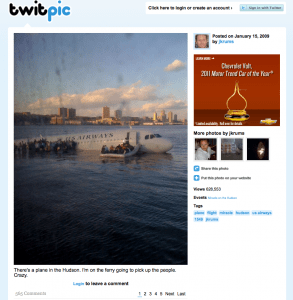Social Media Spamming – Tips and Tricks for How To Avoid It | Lightspan Digital
 “Won’t three Facebook posts per day be too many? I don’t want to be a spammer.” This is a very common concern and our first answer is, “no three posts per day is not too many.” But we think it’s worth discussing a bit further because there is more to spamming in social media than just frequency.
“Won’t three Facebook posts per day be too many? I don’t want to be a spammer.” This is a very common concern and our first answer is, “no three posts per day is not too many.” But we think it’s worth discussing a bit further because there is more to spamming in social media than just frequency.
All too often we define spamming as too much of something when in fact any unwanted, irrelevant and out of context communication can be perceived as spam. This is why you may have heard a new term, digital noise.
Let’s look at ways to be active online, all day long if you choose to, and create content that’s not seen as digital noise.
1. BE INTERESTING:
When considering how you are being perceived online interest comes first, not frequency. Let’s debunk a myth right up front – you can’t just BE on Twitter and Facebook and expect masses to flock to you (unless you’re already famous). You have to BE INTERESTING.
Here are a few ways to go about it:
a. Connect with those with familiar or complimentary location, interests, themes, or strengths
- :
Random following is a true spammer move and will bring you little business value. There’s little to no value in getting 1,000 followers in Romania when your business is in Naperville.
My favorite way to find good people to follow and connect with is by using Twitter lists that others created. Here’s a great non-profit Twitter list curated by my Twitter friend @HeidiEKMassey. If you’re a non-profit or interested in community work you’ll find many like-minded people and organizations on that list. In fact all of Heidi’s lists are a great resource.
b. Learn what your followers are into:
Find out what motivates their online participation. Use TwitterSheep.com to produce a cloud tag of the most common themes in your Twitter follower’s bios. Facebook doesn’t easily give access to such information but you can find some demographic and location information in your Facebook Insights dashboard.
Use this data to create a few top personas and use those personas to guide the focus of your content. In other words, build your content as if you were talking to these people directly.
c. Show you’re interested in them:
Networking online is very similar to being on a date. If the other person just spent two hours talking about themselves, they don’t seem as interesting anymore do they? They’re not interesting because they’re not showing interest in you. So ask your followers questions to find out more about their passions. Recommend articles they’d be interested in. Chat with them about things they care about.
2. PLAY IN CONTEXT:
Context in social media is an often-forgotten element. Consider that social media channels are like public news services but move hundreds of times faster than any publication.
Today it is common for news to break on Twitter first. Remember the Hudson river plane landing? The images were on Twitter 15 minutes before the main news media broke the story.
So let’s debunk another myth – we may think that what we have to say should be interesting all the time, at any time, but if the online topic of the day is the Hudson plane landing our topic loses. So we might as well play in the context and enter the conversation around the topic of the day.
So here’s how I go about it – I read the news and I look for trending topics. Google delivers Twitter trending topics now so just do a search. Take the pulse. And play in context.
3. WATCH THE FREQUENCY:
Social networking sites are unregulated communication freeways. Conversation moves fast, often and much. There are no speed limits and all rules are self-imposed and come out of street smarts. Yes, all the social rules you learned in school, church, networking events, unspoken rules on how to make friends and be interesting apply. You get to choose if you are going to be the rebel or the brainiac and you get to choose who you “hang out” with accordingly.
So if you’re cool and interesting, and show interest in people you can talk a lot and most people won’t mind.
Additionally social media conversation, wall posts and streams move at highway speeds for most people who follow 200 people or more. The more people someone follows, the faster the streams move to them. It’s like living by the freeway instead of on a quiet street. On the quiet street you only see a few cars a day, so it’s easier to notice all of them. When looking at the freeway there are too many cars that pass by. You’ll only notice and remember those that have or do something unusual to make them stand out.
There are a few behaviors to watch for:
a. Avoid event spam:
Social media channels are overused for event promotion. There I said it! I will challenge you next time you have an event to pick up the phone and call the attendees you most want and ask them to invite friends, associates etc. I will also encourage you to start using email for event promotions.
b. Be smart about #FollowFriday:
I believe in giving props but Fridays are becoming national digital noise days on Twitter. Don’t let your twitter stream become an endless list of people you think are awesome. Use a Follow Friday list, or a blog post to call out those you appreciate and tell people why.
Our friends (clients) at Episcopal Charities @ECCSOnline, who are very new on Twitter, did this one right. Here’s how they gave props (on a Tuesday):
“Recommends @orbittracker for GREAT comprehensive web design services http://ow.ly/3aPn3.”
We promise we didn’t show them how to do that. They just naturally expressed gratitude and that’s what today’s Follow Friday is missing.
c.Test out before rolling out new features or iphone apps to avoid unwanted spam:
When not familiar with a service or feature test them out or install them late at night when traffic is lowest. I learned this one the hard way. I installed a new iphone application and turned Foursquare notifications on. The application went into my Foursquare account and broadcast (to my entire Facebook and Twitter networks) a post for EACH past Foursquare check-in. All in all about 300 posts all at once. Did you ever get hate mail? It’s not pleasant. I immediately deleted all posts (a painfully long job) and publicly and individually and profusely apologized.
While most people sympathized with me it wasn’t a pleasant experience and a complete waste of time. So set up test accounts and use those to test new services or applications. Or give us a call and we’ll either know or do the testing for you.
4. DON’T BE A ROBOT:
I wrote about dubious usage of Twitterbefore. Basically, don’t be this guy:

I’m sure there are more such tips. Do you have any good ones? Leave us a comment.


Leave a Reply